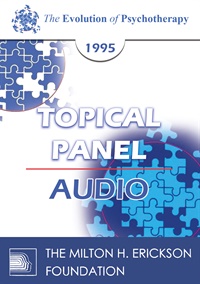EP95 Panel 18 - Therapeutic Neutrality or Social Commitment? - Mary Goulding, MSW; James Hillman, PhD; James Masterson, MD; and Salvador Minuchin, MD
- Average Rating:
- Not yet rated
- Topic Areas:
- Topical Panels | Psychotherapy | Systems Theory | Therapist Techniques
- Categories:
- Evolution of Psychotherapy | Evolution of Psychotherapy 1995 | Pioneers in Couples and Family Therapy
- Faculty:
- Mary Goulding, MSW | James Hillman, PhD | James F. Masterson, MD | Salvador Minuchin, MD
- Course Levels:
- Master Degree or Higher in Health-Related Field
- Duration:
- 57:27
- Format:
- Audio Only
- Original Program Date:
- Dec 16, 1995
- License:
- Never Expires.
Description
Description: This panel explores whether therapeutic neutrality is realistic—or even desirable. Panelists challenge the idea of neutrality, suggesting that clinical work inevitably reflects social values. They debate when transparency, advocacy, and political awareness may be appropriate, especially in family therapy and work with personality disorders, highlighting the evolving role of the therapist as both healer and engaged citizen.
Moderated by Camillo Loriedo, MD.
Educational Objectives:
- To compare and contrast clinical and philosophical perspectives of experts.
*Sessions may be edited for content and to preserve confidentiality*
Credits
Handouts
| Timestamped Transcript (796.6 KB) | 18 Pages | Available after Purchase |
Faculty
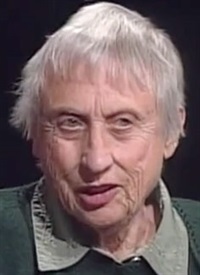
Mary Goulding, MSW Related Seminars and Products
Mary Goulding, MSW, is one of the leading exponents of Transactional Analysis. Along with her husband Robert Goulding, she developed an approach called Redecision therapy which synthesizes Transactional Analysis and Gestalt. Together they founded the Western Institute for Group and Family Therapy in Watsonville, California, and co-authored two professional books about their approach. There is also an edited volume about the Redecision model. Mary has served as a member of the Board of Trustees of the International Transactional Analysis Association and is a Teaching Member of that organization. Her M.S.W. was granted in 1960 from the School of Social Welfare, University of California, Berkeley.
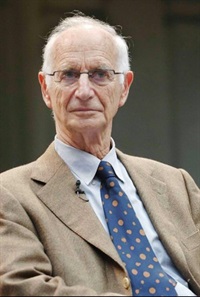
James Hillman, PhD Related Seminars and Products
James Hillman, PhD, who received his Ph.D. degree from the Univeristy of Zurich, has served as honorary secretary of the International Association for Analytical Psychology and for 10 years was Director of Studies at the C.G. Jung Institute in Zurich. He has written 12 books and was nomiated for a Pulitzer prize.
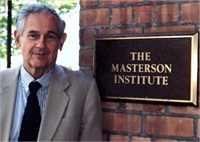
James F. Masterson, MD Related Seminars and Products
James F. Masterson (M.D., Jefferson Medical School, 1951) was Director of the Masterson Group, P.C., which specializes in the treatment of adolescent and adult character disorders. Additionally, he was Director of the Masterson Institute (formerly Character Disorder Foundation); attending psychiatrist at New York Hospital, Payne Whitney Clinic; and Adjunct Clinical Professor of Psychiatry at Cornell University Medical College. Masterson has authored seven books and edited two volumes, mostly on the topic of psychoanalytic approaches to character disoreders and adolescents. His seminal work on the borderline personality has made him one of the most influential and studied practitioners of modern psychoanalytic methods.
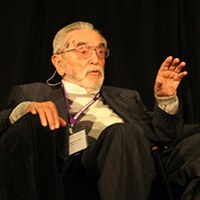
Salvador Minuchin, MD Related Seminars and Products
Salvador Minuchin, MD, developed Structural Family Therapy, which addresses problems within a family by charting the relationships between family members, or between subsets of family. He was Director of the Philadelphia Child Guidance Clinic. Although it was minimally staffed when he began, under his tutelage the Clinic grew to become one of the most modeled and respected child guidance facilities in the world. In 1981, Minuchin began his own family therapy center in New York. After his retirement in 1996, the center was renamed the Minuchin Center. Dr. Minuchin is the author of many notable books, including many classics. His latest is Mastering Family Therapy: Journeys of Growth and Transformation. In 2007, a survey of 2,600 practitioners named Minuchin as one of the ten most influential therapists of the past quarter-century.


